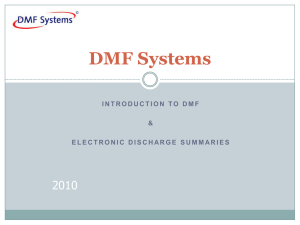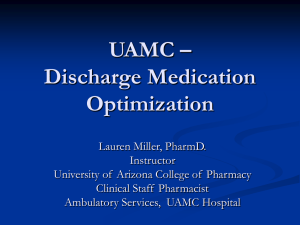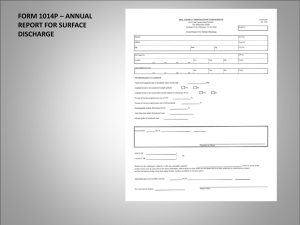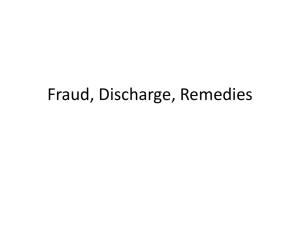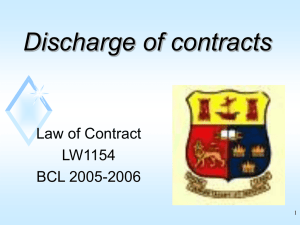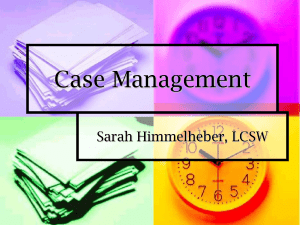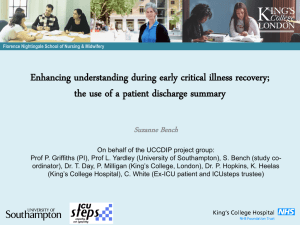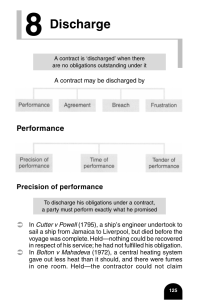Commercial law Discharge of Contract
advertisement
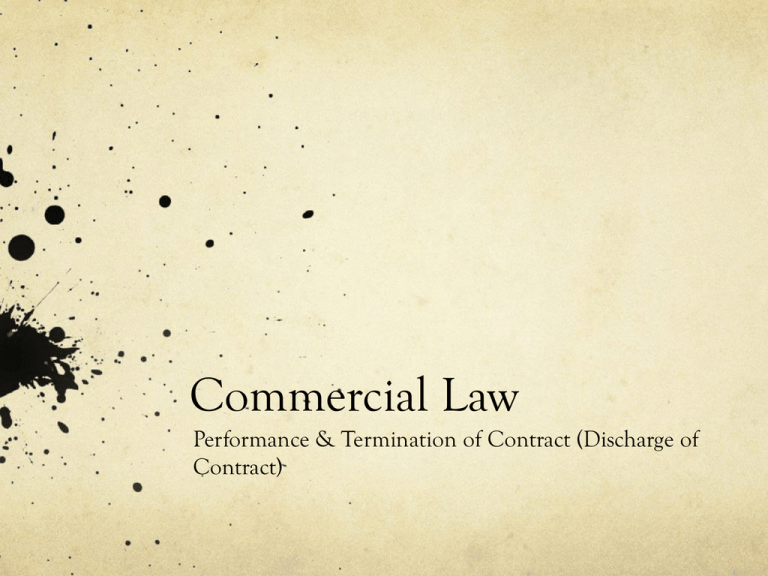
Commercial Law Performance & Termination of Contract (Discharge of Contract) Discharge of Contract What is discharge of contract? Answer: It relates to the circumstances in which the contract is brought to and end. Why is it important? Answer: To free each party from their obligations under the contract. To end the contractual relationship. To end potential liability that may arise from the contract. Discharge of Contract A contract may be discharged by FOUR circumstances. Discharge by: Performance Agreement Frustration Breach Discharge by Performance General Rule: Performance of contract must be exact and precise and should be in accordance with the promise made by the parties. Authority: S.38(1) CA - The parties to a contract must either perform, or offer to perform, their respective promises, unless the performance is dispensed with or excused under this Act, or of any other law. See also S.38(2) CA – what do you understand from it? Obligation of parties to contracts 38. (1) The parties to a contract must either perform, or offer to perform, their respective promises, unless the performance is dispensed with or excused under this Act, or of any other law. (2) Promises bind the representatives of the promisors in case of the death of the promisors before performance, unless a contrary intention appears from the contract. ILLUSTRATIONS (a) A promises to deliver goods to B on a certain day on payment of RM1,000. A dies before that day. A’s representatives are bound to deliver the goods to B, and B is bound to pay the RM1000 to A’s representatives. (b) A promises to paint a picture for B by a certain day, at a certain price. A dies before the day. The contract cannot be enforced either by A’s representatives or by B. Discharge by Performance Example: A and B enters into a contract for the sale and purchase of a car. Contract stated that A shall deliver the car to B’s place of study in Terengganu and B shall pay the money due upon arrival of the car. When does discharge by performance occur? Discharge by Performance: Exceptions GR = Performance must be exact and precise = Entire Contract (The Entire Contract Doctrine) This GR as to performance is mitigated in a number of instances (not fulfill GR but considered as Discharge by Performance nonetheless) Modification of the General Rule Divisible Contracts Acceptance of Partial Performance Substantial Performance Performance Prevented Discharge by Performance Divisible Contracts – A contract may be ENTIRE or DIVISIBLE. An ENTIRE contract is one where the agreement provides that, complete performance = condition precedent to contractual liability. A DIVISIBLE contract is one where the agreement provides that, part of consideration of one party = set off against part performance of the other. Case: Sumpter v Hedges (1898) 1 QB 673 Discharge by Performance Acceptance of Partial Performance – A party received the benefit of partial performance of the agreement under such circumstances that he is able to accept or reject the work, then he is obliged to pay reasonable price for the benefit received. The party who had rendered service may claim for reasonable remuneration (Quantum Meruit – “as much as he has earned”) Case: Christy v Row (1808) Discharge by Performance Substantial Performance - When a person fully performs the contract, but subject to such minor defects that he can be said to have substantially performed his promise. It is regarded as far more just to allow him to recover the contract price reduced by the extent to which his breach of contract lessened the value of what was done, than to leave him with no right of recovery at all. See: Nirwana Construction v Pengarah JKR Negeri Sembilan [2008] 4 MLJ 157 – the football turf case. Discharge by Performance Performance Prevented – if a party is prevented from performing his promise under an agreement, what will happen? Solutions: 1. Recover Quantum Meruit; OR 2. Recover damages under Breach of Contract. Discharge by Agreement General Rule: When both parties to the contract agrees that the contract shall no longer continue, then parties are discharged from their obligations. End a contract with a contract. Discharge by Frustration What is ‘Frustration’? A contract that become legally or physically impossible to perform (impossibility of performance) ‘Force Majeure’ Authority: S.57(2) CA - contract to do an act which, after the contract is made, becomes impossible, or by reason of some event which the promisor could not prevent, unlawful, becomes void when the act becomes impossible or unlawful. Example - A agrees with B to discover treasure by magic. The agreement is void. Discharge by Frustration The act must be ‘impossible to perform’ not merely ‘difficult’ to perform. It occurs after formation of the contract. Frustration must not be self induced. Examples: War, fire, natural disaster (act of God), riot, strike, crime. Discharge by Frustration: Effects Contract become VOID What will happen to the parties? Seek remedies available for contract discharged by frustration, which are: S.57(3) – compensation must be paid by the promisor to the promisee for loss through non-performance of act known to be impossible. S.66 – any person who has received any advantage under the agreement is bound to restore it OR compensate it. Discharge by Breach Where one party indicates to the other the intention not to go on with the contract, the party is said to have REPUDIATED the contract. A refusal to perform may occur before it is due (anticipatory breach) OR during performance itself (actual breach). Refusal will cause breach of contract. Breach of contract will discharge the contract. Discharge by Breach: Effect Breach of Contract!

